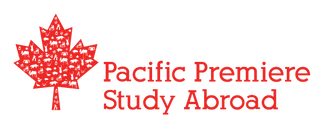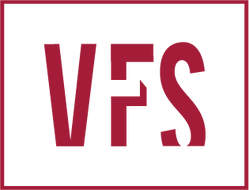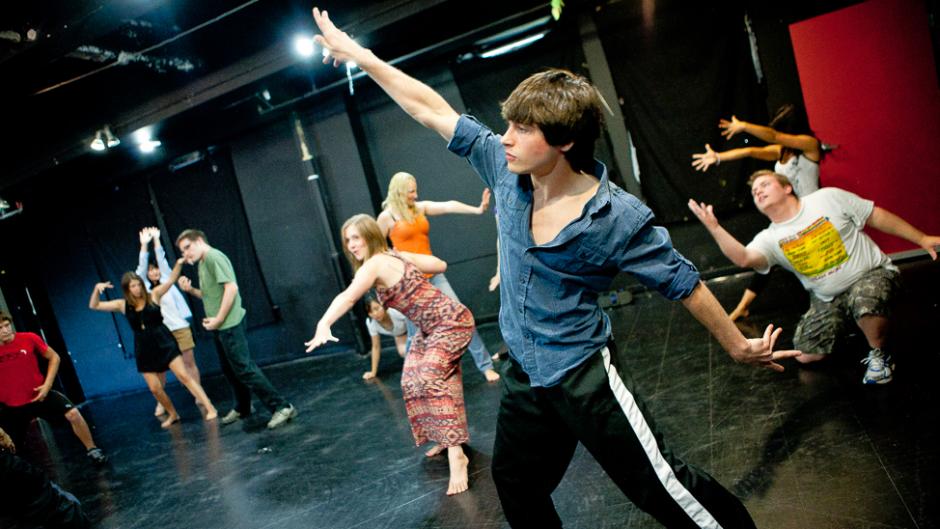โปรแกรม Acting Essentials Certificate (4 เดือน)
สถาบัน Vancouver Film School
About Vancouver Film School (VFS)
สถาบัน Vancouver Film School (VFS) เป็นสถาบันชั้นนำของโลกด้านการถ่ายทำภาพยนตร์ การออกแบบแอนิเมชั่น, Visual Effects, และงานดิจิตอลดีไซน์ต่าง ๆ โดยสถาบันนี้ได้ถูกก่อตั้งขึ้นในปี 1987 เป็นสถาบันที่ได้รับความนิยมสูงทั้งจากนักเรียนในประเทศแคนาดา ประเทศสหรัฐอเมริกา และนักเรียนนานาชาติจากทั่วโลกที่สนใจมาเรียน ณ สถาบันอันโด่งดังแห่งนี้
สถาบัน Vancouver Film School (VFS) เป็นสถาบันชั้นนำของโลกด้านการถ่ายทำภาพยนตร์ การออกแบบแอนิเมชั่น, Visual Effects, และงานดิจิตอลดีไซน์ต่าง ๆ โดยสถาบันนี้ได้ถูกก่อตั้งขึ้นในปี 1987 เป็นสถาบันที่ได้รับความนิยมสูงทั้งจากนักเรียนในประเทศแคนาดา ประเทศสหรัฐอเมริกา และนักเรียนนานาชาติจากทั่วโลกที่สนใจมาเรียน ณ สถาบันอันโด่งดังแห่งนี้
Acting Essentials (4-month program)
Term 1
Introduction to Acting
This course introduces students to some of the fundamental skills and tools required for developing the acting process. They build self-awareness, develop their imagination and concentration, recognize their emotional truth, learn the actor’s vocabulary, and demonstrate the ability to be honest and committed in their acting. In addition, students learn how to behave as a professional actor as they demonstrate the focus and respect necessary in an acting class, on stage, or on set.
Introduction to Voice
Students encounter the concept of “Your Voice as Your Instrument.” In addition, they begin to develop basic vocal technique for actors and work towards developing a voice that can be clearly understood and physically grounded in the body, mind, imagination, and emotions. Class work includes breathing, stretching, grounding, relaxation, resonance, range, articulation, and the creation of a personal physical and vocal warm-up. Particular emphasis is given to the importance of the voice in the craft of the actor.
Introduction to Text Analysis
In this course students learn practical techniques for analyzing film, television, and theatre scripts. They develop a process for creating character using techniques such as choosing objectives, assessing given circumstances, and unit analysis. When demonstrating this process, students are directed through various acting and text breakdown exercises. They learn how this process translates into informed, truthful performances.
Introduction to Movement
This introductory movement course is designed to prepare students to learn to act. Postural habits are revealed and redirected in order for the student to develop a grounded, centred, and dynamic body use. Various physical techniques are introduced, including Experiential Anatomy, Yoga, Relaxation Exercises, Creative Movement, and Laban. Through the process of exploring physical and personal awareness, students develop an aligned, expressive, and efficiently moving body that is more responsive to the needs of their imagination.
Introduction to Improvisation
Characters, environments, and scene building are the key fundamentals of storytelling. Students have an opportunity to develop skills that embolden self-confidence, spontaneity, and imagination in order to enhance scenes and auditions.
Introduction to Camera
Students learn fundamental techniques required to perform confidently in front of a camera. Through a series of important exercises, they learn how to make smart actor’s choices for various shot types and scenarios. They also develop a deeper understanding, level of respect, and appreciation for set etiquette, professionalism, and other crew members on set.
Introduction to Audition
Every actor needs to audition. This course helps students gather the skills for auditioning for roles in film, TV, and commercials. They learn what an audition is, who the players are, and what is expected of an actor in a professional situation. By simulating the audition process and reviewing their screen work in class, students begin to explore the technical aspects of working in front of a camera, the preparation of text involved, and how to present themselves with confidence and creativity.
Voice Experience 1
Students build upon basic vocal technique with specific master classes in the following areas: support for sound, the articulators, and speech. In these three sessions students begin to understand the importance of the physical support required to give clear and enunciated speech while staying relaxed and grounded in their body.
Rehearsal Lab
The Rehearsal Lab provides a mentored and guided space for self-directed preparation and rehearsal. It is designed to encourage and exercise the self-motivated work an actor must pursue—how do I prepare for an audition, for a scene, for a class, or for a gig? How do I develop my discipline and focus to make my practice fun and rewarding? You will be guided to work on the projects, scripts and auditions that need to be prepared and rehearsed for class. Some of this work will happen individually, or in groups. Students will meet in a “homeroom” at the start of each Rehearsal Lab, and will sign in to the worksheet with the work that will be explored in the lab time. For some classes, such as Acting Fundamentals, you will need to keep a Rehearsal Log stating what you accomplished in your lab time.
Movement Experience 1
In Movement Experience 1 students will gain techniques through specific master classes which serves to support their learning in Introduction to Movement. Movement Experience 1 will consist of three workshops in the following areas: actor recovery & relaxation, animal exploration & ensemble building and laban. Through these master classes students will gain tools to regulate their nervous systems, explore using animals to create characters, experience ensemble building techniques and experience laban exercises.
Term 2
Acting Fundamentals
Jumping into script work, students explore fundamental acting skills and tools required for working with text. They begin to explore the rehearsal process and play with more confidence, while engaging with the importance of text analysis and research. Through various scene exercises and full script analysis, students learn how to build authentic characters and work towards developing a longer scene to present in front of their peers. In collaboration with the Intro to Camera course, students prepare a short version of the scene for camera.
Voice Fundamentals
This course encourages each student to further demonstrate voice principles and strategies through their body, mind, imagination, and emotions. Designed to reinforce and build upon the fundamental voice techniques learned in Term 1, students apply these by working with selected poetry and scenes. They gain a greater understanding of how the voice work applies to the craft of the actor and create an individual final voice project to be performed at the end of the term.
Movement Fundamentals
This fundamental movement course is designed to reinforce and build upon the principles explored in Introduction to Movement. Postural habits continue to be revealed and redirected in order for the student to develop grounded, centred, and dynamic body use supporting greater integrated with the mind, emotions, and voice. Students also gain the tools to design a self-directed actor’s warm-up, explore physical transformations for character development, and create an ensemble movement piece. Focus is placed on integrating movement skills with acting fundamentals script work.
Improvisation Fundamentals
Improvisation fundamentals hone students' skills by combining Term 1 elements with improvised storytelling, and revealing the relationship between actor, writer, and director. This course further expands each actor's capabilities and methods to develop character.
Audition Fundamentals
Through fine-tuning fundamental auditioning skills, students gain self-awareness, technical skills, focus, and versatility in a variety of audition situations. Simulated auditions and call-backs help students strengthen and focus their acting technique with increasingly challenging texts. By reviewing their work on screen, they build self-awareness and technical mastery of the audition frame. This course highlights critical professional skills needed to thrive in the audition room.
Camera Fundamentals
This course solidifies how to motivate and/or justify technical film requirements from an acting perspective. Students begin to understand the importance of continuity through specific on-camera exercises, discovering how actors’ choices affect storytelling within the frame. It deepens the actors respect for film, film acting, and cinematography.
Movement Experience 2
In Movement Experience 2, students gain techniques through specific master classes which serve to support their learning in Movement Fundamentals. Through workshops in these master classes students have the opportunity to work with both neutral and character masks, learn the basics of mime, experience the energy of clown, and explore authentic movement through the five rhythms method.
Voice Experience 2
In this course, students build upon the experience and skills learned in voice fundamentals through a series of master classes in the following areas: Operative Words and Argument, Meaning and Emphasis, and Unlocking the Text. These classes are specifically aimed at finding the possibilities in the text that add depth and detail to a performance.
Rehearsal Lab
The Rehearsal Lab provides a mentored and guided space for self-directed preparation and rehearsal. It is designed to encourage and exercise the self-motivated work an actor must pursue—how do I prepare for an audition, for a scene, for a class, or for a gig? How do I develop my discipline and focus to make my practice fun and rewarding? You will be guided to work on the projects, scripts and auditions that need to be prepared and rehearsed for class. Some of this work will happen individually, or in groups. Students will meet in a “homeroom” at the start of each Rehearsal Lab, and will sign in to the worksheet with the work that will be explored in the lab time. For some classes, such as Acting Fundamentals, you will need to keep a Rehearsal Log stating what you accomplished in your lab time.
Acting Fundamentals
Jumping into script work, students explore fundamental acting skills and tools required for working with text. They begin to explore the rehearsal process and play with more confidence, while engaging with the importance of text analysis and research. Through various scene exercises and full script analysis, students learn how to build authentic characters and work towards developing a longer scene to present in front of their peers. In collaboration with the Intro to Camera course, students prepare a short version of the scene for camera.
Voice Fundamentals
This course encourages each student to further demonstrate voice principles and strategies through their body, mind, imagination, and emotions. Designed to reinforce and build upon the fundamental voice techniques learned in Term 1, students apply these by working with selected poetry and scenes. They gain a greater understanding of how the voice work applies to the craft of the actor and create an individual final voice project to be performed at the end of the term.
Movement Fundamentals
This fundamental movement course is designed to reinforce and build upon the principles explored in Introduction to Movement. Postural habits continue to be revealed and redirected in order for the student to develop grounded, centred, and dynamic body use supporting greater integrated with the mind, emotions, and voice. Students also gain the tools to design a self-directed actor’s warm-up, explore physical transformations for character development, and create an ensemble movement piece. Focus is placed on integrating movement skills with acting fundamentals script work.
Improvisation Fundamentals
Improvisation fundamentals hone students' skills by combining Term 1 elements with improvised storytelling, and revealing the relationship between actor, writer, and director. This course further expands each actor's capabilities and methods to develop character.
Audition Fundamentals
Through fine-tuning fundamental auditioning skills, students gain self-awareness, technical skills, focus, and versatility in a variety of audition situations. Simulated auditions and call-backs help students strengthen and focus their acting technique with increasingly challenging texts. By reviewing their work on screen, they build self-awareness and technical mastery of the audition frame. This course highlights critical professional skills needed to thrive in the audition room.
Camera Fundamentals
This course solidifies how to motivate and/or justify technical film requirements from an acting perspective. Students begin to understand the importance of continuity through specific on-camera exercises, discovering how actors’ choices affect storytelling within the frame. It deepens the actors respect for film, film acting, and cinematography.
Movement Experience 2
In Movement Experience 2, students gain techniques through specific master classes which serve to support their learning in Movement Fundamentals. Through workshops in these master classes students have the opportunity to work with both neutral and character masks, learn the basics of mime, experience the energy of clown, and explore authentic movement through the five rhythms method.
Voice Experience 2
In this course, students build upon the experience and skills learned in voice fundamentals through a series of master classes in the following areas: Operative Words and Argument, Meaning and Emphasis, and Unlocking the Text. These classes are specifically aimed at finding the possibilities in the text that add depth and detail to a performance.
Rehearsal Lab
The Rehearsal Lab provides a mentored and guided space for self-directed preparation and rehearsal. It is designed to encourage and exercise the self-motivated work an actor must pursue—how do I prepare for an audition, for a scene, for a class, or for a gig? How do I develop my discipline and focus to make my practice fun and rewarding? You will be guided to work on the projects, scripts and auditions that need to be prepared and rehearsed for class. Some of this work will happen individually, or in groups. Students will meet in a “homeroom” at the start of each Rehearsal Lab, and will sign in to the worksheet with the work that will be explored in the lab time. For some classes, such as Acting Fundamentals, you will need to keep a Rehearsal Log stating what you accomplished in your lab time.
Admission Requirements:
- TOEFL – score of 80 internet-based (iBT), or 550 paper-based (PBT)
- TOEIC – score of 785
- Cambridge CAE or FCE – completion of any level with Grade A or B
- IELTS Band 6.5 – Academic level
- LPI – Level 5
- VFS English Language School Partners
- สามารถเรียนโปรแกรมภาษาแทนการยื่นคะแนนภาษาได้ค่ะ
Tuition Fees
สำหรับน้อง ๆ ที่สนใจโปรแกรมนี้ สามารถกรอกแบบฟอร์มสอบถามด้านล่างเพื่อสอบถามข้อมูลเพิ่มเติมและค่าเรียนได้ค่ะ
สำหรับน้อง ๆ ที่สนใจโปรแกรมนี้ สามารถกรอกแบบฟอร์มสอบถามด้านล่างเพื่อสอบถามข้อมูลเพิ่มเติมและค่าเรียนได้ค่ะ
Contact Us
สนใจข้อมูลเพิ่มเติม สามารถสอบถามได้ที่ (085) 658-7000 (สาขากรุงเทพฯ) และ (778) 995-4763 (สาขาแวนคูเวอร์) ค่ะ


